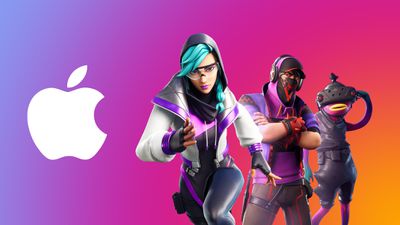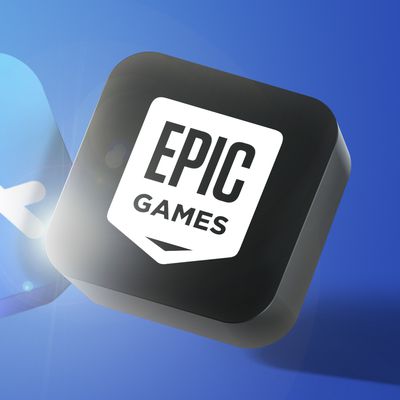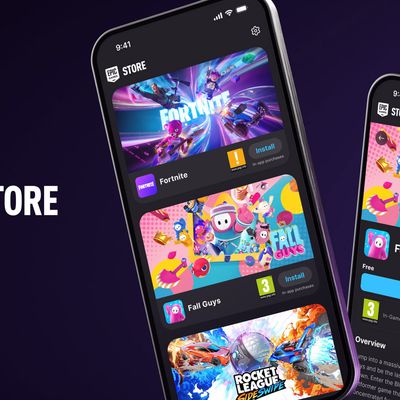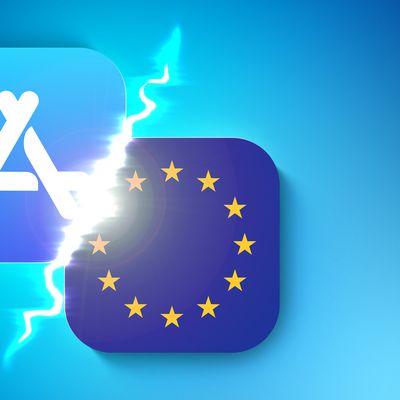Apple has faced increasing scrutiny over its App Store practices from both developers and regulators in recent months. One particularly vocal critic has been Fortnite creator Epic Games, which has repeatedly referred to the App Store as a monopoly.

In August 2020, Apple removed Fortnite from the App Store after Epic Games introduced a direct payment option in the app for its in-game currency V-Bucks, defying the App Store rules. In what appears to have been an orchestrated move, Epic Games promptly filed a lawsuit against Apple, accusing the company of anti-competitive actions.
Below, we've put together a timeline of the Epic Games vs. Apple saga.
June 16
- Epic Games CEO Tim Sweeney tells The Washington Post that "the iOS App Store's monopoly protects only Apple profit, not device security."
- Sweeney quote tweets The Washington Post's story: "Here Apple speaks of a level playing field. To me, this means: All iOS developers are free to process payments directly, all users are free to install software from any source. In this endeavor, Epic won't seek nor accept a special deal just for ourselves."
June 23
- Sweeney tweets: "Opening iOS and Android up as truly open platforms with a genuinely level playing field between first party and third party apps and stores is the only way to ensure a competitive, healthy, and fair app economy."
July 24
- Sweeney tells CNBC that the App Store is an "absolute monopoly," arguing that "Apple has locked down and crippled the ecosystem by inventing an absolute monopoly on the distribution of software, on the monetization of software."
July 28
- Sweeney tweets: "It pains me to complain about Apple in this way. Apple is one of the greatest companies that has ever existed, perhaps the greatest. But they're fundamentally wrong in blocking competition and choice on devices they make, and that holds up entire fields of technological progress."
- Sweeney tweets: "This is a critical consideration in these 30% store fees. They come off the top, before funding any developer costs. As a result, Apple and Google make more profit from most developers' games than the developers themselves. That is terribly unfair and exploitative."
August 1
- Sweeney tweets: "Apple's intentional anti-competitive strategy has been running for much longer than most realize. Here they are in 2011 muscling Kindle purchases off of iPhone by demanding 30% of e-book revenue, 'which we acknowledge is prohibitive for many things.'"
August 13
- Epic Games introduces a direct payment option in the Fortnite app for iPhone and iPad, allowing players to purchase in-game V-Bucks at a 20 percent discount by sidestepping Apple's in-app purchase mechanism. This functionality violates Apple's App Store Review Guidelines, which indicate that apps offering in-game currency must use Apple's in-app purchase mechanism only.
- The direct payment option is also added to the Fortnite app on Android in violation of Google's Play Store rules.
- Epic Games describes Apple's and Google's 30 percent cut on in-app purchases as "exorbitant." Epic also notes that apps that offer real-life goods and services like Uber, DoorDash, and StubHub are not required to use Apple's in-app purchase mechanism, a rule that it believes should apply to all developers.
-
Apple removes Fortnite from the App Store. In a statement shared with MacRumors, the company said that "Epic Games took the unfortunate step of violating the App Store guidelines that are applied equally to every developer and designed to keep the store safe for our users." The full statement is below.
Today, Epic Games took the unfortunate step of violating the App Store guidelines that are applied equally to every developer and designed to keep the store safe for our users. As a result their Fortnite app has been removed from the store. Epic enabled a feature in its app which was not reviewed or approved by Apple, and they did so with the express intent of violating the App Store guidelines regarding in-app payments that apply to every developer who sells digital goods or services.
Epic has had apps on the App Store for a decade, and have benefited from the App Store ecosystem - including its tools, testing, and distribution that Apple provides to all developers. Epic agreed to the App Store terms and guidelines freely and we're glad they've built such a successful business on the App Store. The fact that their business interests now lead them to push for a special arrangement does not change the fact that these guidelines create a level playing field for all developers and make the store safe for all users. We will make every effort to work with Epic to resolve these violations so they can return Fortnite to the App Store.
- Epic Games files a lawsuit [PDF] against Apple in California, describing the company as a "monopoly power" and accusing it of "unfair and anti-competitive actions." The complaint alleges that "Apple has become what it once railed against: the behemoth seeking to control markets, block competition, and stifle innovation."
-
Epic Games shares a video called "Nineteen Eighty-Fortnite," parodying Apple's iconic "1984" ad. Whereas Apple's ad portrayed IBM as the evil "Big Brother," Epic Games aims to show that Apple is now the dominant power. "Epic Games has defied the App Store Monopoly. In retaliation, Apple is blocking Fortnite from a billion devices. Join the fight to stop 2020 from becoming '1984.'"
- In a blog post, Epic Games encourages Fortnite players to fight against Apple's "app tax" by using the hashtag #FreeFortnite on social platforms.
- In an FAQ, Epic Games says that "all mobile developers and consumers have the right to choose alternate payment providers that charge less, as is the norm on all other general-purpose computing platforms, including Web, Windows, and Mac." Epic adds that "Apple even allows Amazon Prime Video to process payments directly as a special deal while holding other apps to a different standard."
- Spotify sides with Epic Games.
- Google removes Fortnite from the Play Store.
- Epic Games files a similar anti-competitive lawsuit against Google.
- Sweeney tweets: "Today, Apple said Epic is seeking a special deal, but that's not true. We're fighting for open platforms and policy changes equally benefiting all developers. And it'll be a hell of a fight!"
August 14
- Sweeney tweets: "At the most basic level, we're fighting for the freedom of people who bought smartphones to install apps from sources of their choosing, the freedom for creators of apps to distribute them as they choose, and the freedom of both groups to do business directly."
August 17
- Epic Games reveals that its Apple Developer Program account will be terminated on August 28, 2020 unless it resolves violations of the Developer Program License Agreement, including introducing new payment functionality that was not submitted to or reviewed by Apple's App Review team. Apple says this would result in Epic Games losing access to all of Apple's software, SDKs, APIs, and developer tools. Without that access, Epic Games says it cannot develop future versions of its Unreal Engine game engine for use on iOS or macOS.
- The Information reports that Epic Games is seeking to form a "coalition of Apple critics."
- In a statement, Apple says "we won't make an exception for Epic because we don't think it's right to put their business interests ahead of the guidelines that protect our customers."
August 20
- Epic Games announces it is hosting a "#FreeFortnite Cup" tournament on August 23 for "one more Victory Royale with friends across all platforms."
August 21
- In a court filing, Apple says that Epic Games emailed the company on June 30 asking for a "special deal" that would allow its Epic Games Store app on iOS, sidestepping Apple's in-app purchase mechanism. Apple also likens Epic's behavior to shoplifting: "If developers can avoid the digital checkout, it is the same as if a customer leaves an Apple retail store without paying for shoplifted product: Apple does not get paid."
- Sweeney tweets: "Apple's statement is misleading. You can read my email in Apple's filing, which is publicly available. I specifically said in Epic's request to the Apple execs, 'We hope that Apple will also make these options equally available to all iOS developers...'"
August 23
- In a court filing, Epic Games argues that Apple's plan to terminate its Developer Program membership would be "overbroad retaliation" and "an unlawful effort to maintain its monopoly and chill any action by others who might dare oppose Apple."
- Microsoft files a declaration in support of Epic Games, in which Xbox gaming executive Kevin Gammill writes that "Apple's discontinuation of Epic's ability to develop and support Unreal Engine for iOS or macOS will harm game creators and gamers."
August 24
- U.S. Judge Yvonne Gonzalez Rogers grants a temporary restraining order that will prevent Apple from blocking Epic Games' access to development tools for its Unreal Engine, but as of now, she is not forcing Apple to put Fortnite back on the App Store. The restraining order goes into effect immediately and will remain in force until the court issues a final order on the motion for preliminary injunction in September.
August 25
- Apple issues the following statement: "We thank the court for recognizing that Epic's problem is entirely self-inflicted and is in their power to resolve. Our very first priority is making sure App Store users have a great experience in a safe and trusted environment, including iPhone users who play Fortnite and who are looking forward to the game's next season. We agree with Judge Gonzalez-Rogers that 'the sensible way to proceed' is for Epic to comply with the App Store guidelines and continue to operate while the case proceeds. If Epic takes the steps the judge has recommended, we will gladly welcome Fortnite back onto iOS. We look forward to making our case to the court in September."
August 26
- Epic Games confirms that the upcoming season of Fortnite will not be available to players on iPhone, iPad, or Mac due to the company's legal battle with Apple, preventing cross-platform play.
August 27
- Epic Games emails players noting that "Apple has blocked Fortnite updates on iOS and Mac devices," adding that "Apple limits competition so they can collect 30% of consumer payments made in apps like Fortnite, raising the prices you pay."
August 28
- Apple terminates Epic Games' developer account tied to Fortnite.
September 4
- Epic Games files for a preliminary injunction that would both allow Fortnite back on the App Store and restore access to its developer account.
September 8
- Apple countersues Epic Games, requesting damages for breach of contract. In its answer, Apple describes Epic Games as a "multi-billion dollar enterprise that simply wants to pay nothing for the tremendous value it derives from the App Store."
September 9
- Epic Games announces that Apple will no longer allow users to sign into Epic Games accounts using "Sign in with Apple" as soon as September 11.
September 10
- Epic says Apple has "provided an indefinite extension" to Sign in with Apple support, but Epic still encourages users to transition their accounts to alternative credentials in case Apple does disable the feature at some point in the future.
September 28
- U.S. Judge Judge Yvonne Gonzalez Rogers recommends that Apple and Epic Games consider a jury trial around July 2021.
September 29
- Apple and Epic Games agree that Epic's claims and Apple's counterclaims should be tried by the court with a bench trial, rather than a jury trial.
October 9
- U.S. Judge Yvonne Gonzalez Rogers denies Epic Games a preliminary injunction, meaning that Fortnite will remain unavailable on the App Store for the duration of the lawsuit, assuming that the app remains in violation of the App Store Review Guidelines.
For the latest developments in Epic Games vs. Apple, see our coverage below.





















